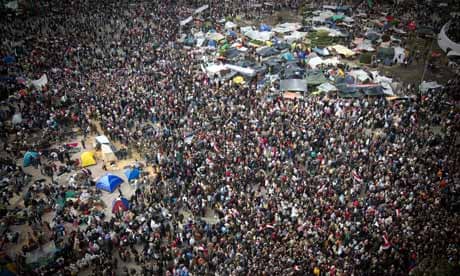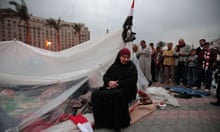The hardcore of revolutionaries who refuse to step outside of Tahrir Square is down to 1,000 or so.
Each night they are squeezed into the cluster of tents planted on the large roundabout at the heart of the square.
The protesters are an unusually mixed community: young and middle-aged, mostly men but a few women and families too. Muslims, Christians and those who choose not to pray have been thrown together in a single cause.
At times the easygoing atmosphere has the air of a festival, as do the long lines for the toilets.
But a glance over at the ever-present soldiers on the edge of the square and the strategically piled rocks – sometimes used to spell out demands such as "leave now" and "get out" – are reminders, if any were needed, of the bloody price paid a few days ago to keep the square in the protesters' hands.
Once the sun is up, Tahrir Square starts to fill. On some days, hundreds of thousands have squeezed in after showing identity cards to the soldiers ringing the square in a disconcerting demonstration of orderliness and respect.
The overnight residents take to clearing up, brushing dirt from the roads, putting rubbish in bags for the dust carts that arrive each day and stacking the stones. The tea sellers emerge and the young boys who sell Egyptian flags for E£10 (£1.40) each.
The morning arrivals come with bread and vegetables for those who have stayed through the night. Amr Mahmoud, who has been in the square since the beginning of the protest a fortnight ago, waves his hand at the small bowl of food before him. He is outraged.
"The government says we are eating Kentucky Fried Chicken. Where is the Kentucky?" he asks. "They say we are paid to be here but we have no money."
The KFC just across the street is firmly shut. It is plastered in anti-government posters and graffiti, as is just about every other business in the square except for a small gift shop whose owner remains a fan of Hosni Mubarak, the Egyptian president.
Along the street, groups of men sit around clapping and chanting. Some in circles, some in lines. One group has laid out a sign that reads: Game Over. Others lead their own demonstrations. A cluster of young men carry a box representing Mubarak's coffin. They jog repeatedly from one side of the square to the other and back again, chanting anti-regime slogans.
A man, bloodied and bandaged from the vicious assault on the demonstrators last week, stands rock-still under a hanging effigy. He raises two fingers in the air in a "V for victory" salute.
Small groups of Islamists gather to read the Qu'ran or listen to lectures. They sit on the ground to the side of the square or next to the tanks. Most Egyptians are Muslim but you might not know it when noon prayers come around each day in the square. Fewer than half the men bother to pray.
Abdul Muhammad, 40, isn't praying. "The Muslim Brotherhood is here but it is only one part of us. We are all Egyptians. Brother with brother against Mubarak," he said. "We talk to people here we do not usually talk to. The poor and the people with money. The Islamists and me.
"I am secular. I do not believe. But we can all talk here in a way we have never talked in Egypt because we are doing what has not happened before – we are not only talking, we are listening."
Periodically, a shout goes up and the protesters break away from the tea and chants to head for the barricades. Sometimes the call comes merely because of a standoff between a few of the demonstrators and a soldier.
Today the protesters blocked an attempt by the authorities to reopen the Mogamma complex of government offices, a cavernous grey Soviet-built pile overshadowing Tahrir Square that Egyptians have come to regard as a special kind of torture. They say that as long as the Mogamma is shut down, no one can claim Egypt is back to normal.





